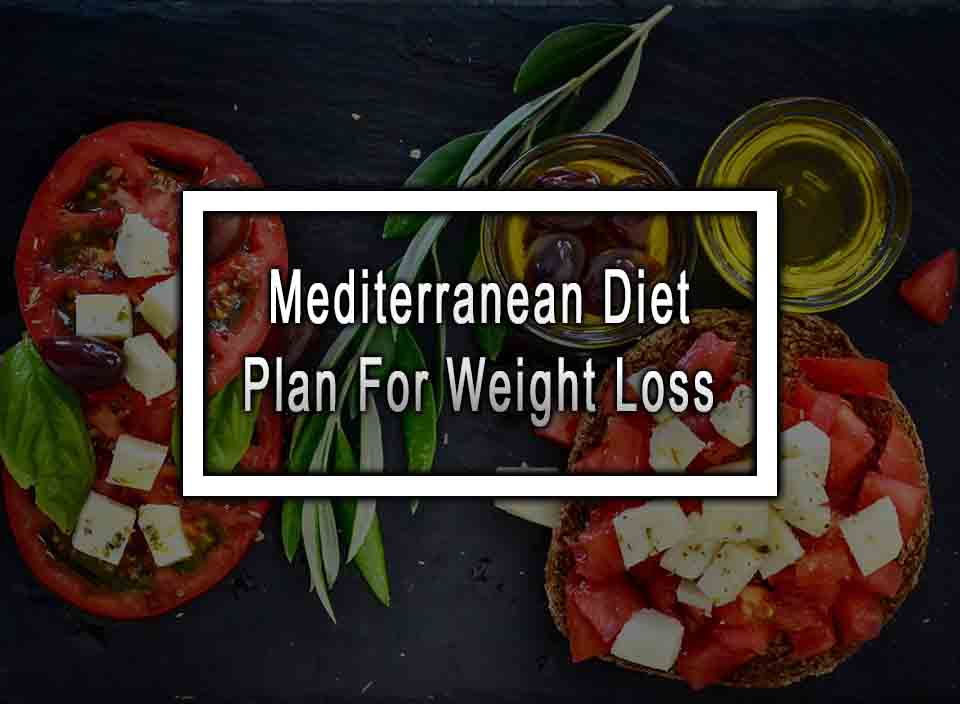The Mediterranean diet is perhaps one of the most popular and healthy diets around the world. It is rich in vitamins, minerals, and essential nutrients necessary for our body. Moreover, the diet has been known to aid in weight loss while providing numerous health benefits. A study has shown that people who follow a Mediterranean diet plan are less likely to suffer from chronic health conditions, including diabetes, obesity, and cancer. The Mediterranean diet plan emphasizes the consumption of fresh fruits, vegetables, whole grains, and lean proteins. In this article, we will explore the Mediterranean diet and how it can be used for weight loss.
Key components of the Mediterranean diet
The Mediterranean diet is based on eating whole, nutrient-dense foods that are low in saturated fats and high in healthy fats. Here are a few key components of the Mediterranean diet plan for weight loss:
Fruits and vegetables
Fresh fruits and vegetables are essential components of the Mediterranean diet. These foods are packed with essential vitamins, minerals, and fiber. A diet high in fiber helps to keep you full for longer periods, thereby reducing your total calorie intake. Fruits and vegetables can be eaten raw or cooked using healthy fats like olive oil.
Whole grains
Whole grains are essential sources of complex carbohydrates, fiber, vitamins, and minerals. They help to keep you full and provide sustained energy levels, which are essential for weight loss. Whole grains like brown rice, quinoa, and whole-wheat bread are excellent choices for a Mediterranean diet plan.
Lean proteins
Lean proteins like fish, chicken, and legumes are essential components of the Mediterranean diet. They provide essential amino acids necessary for muscle growth and repair while keeping you full for longer periods. These proteins can be grilled, baked, or sautéed using healthy oils like olive oil.
Nuts and seeds
Nuts and seeds are rich in healthy fats, vitamins, and minerals. They can be added to salads, yogurt, or eaten as snacks. Eating nuts and seeds in moderation can help reduce your total calorie intake while promoting weight loss.
Healthy oils
Healthy oils like olive oil, avocado oil, and coconut oil are essential components of the Mediterranean diet plan. They are rich in healthy fats, antioxidants, and anti-inflammatory properties. These oils can be used in cooking, baking, or as salad dressings.
Benefits of the Mediterranean diet plan for weight loss
The Mediterranean diet has been proven to be one of the most effective diets for weight loss. Here are a few benefits of the Mediterranean diet plan for weight loss:
Reduced risk of chronic conditions
The Mediterranean diet plan is rich in essential nutrients, vitamins, and minerals necessary for reducing the risk of chronic conditions like diabetes, obesity, cancer, and heart disease. By following the Mediterranean diet plan, you can reduce your risk of these conditions while losing weight.
Improved cardiovascular health
The Mediterranean diet plan emphasizes the consumption of healthy fats like olive oil, nuts, and seeds. These healthy fats help to reduce bad cholesterol, thereby reducing the risk of cardiovascular disease. By following the Mediterranean diet plan, you can improve your cardiovascular health and reduce the risk of heart disease.
Reduced inflammation
The Mediterranean diet plan emphasizes the consumption of anti-inflammatory foods like fruits, vegetables, healthy fats, and whole grains. These foods help to reduce inflammation, which can contribute to weight gain and chronic conditions. By following the Mediterranean diet plan, you can reduce inflammation, which can enhance weight loss.
Improved sleep quality
Sleep is essential for weight loss, and the Mediterranean diet plan can help improve the quality and duration of sleep. By consuming healthy foods like fruits, vegetables, whole grains, and lean proteins, you can improve your sleep quality, leading to better weight-loss outcomes.
Conclusion
In conclusion, the Mediterranean diet plan is an excellent choice for weight loss and promoting overall health. It emphasizes the consumption of whole, nutrient-dense foods that are low in saturated fats and high in healthy fats. By incorporating the key components of the Mediterranean diet plan, including fruits and vegetables, whole grains, lean proteins, nuts and seeds, and healthy oils into your daily diet, you can improve your overall health, reduce the risk of chronic conditions, and achieve your weight loss goals. Remember to consult your healthcare provider before starting any new diet or exercise program.
Mediterranean Diet Plan FAQs
Here are the most common questions about the Mediterranean diet plan.
1. How do I get started with the Mediterranean diet?
To get started with the Mediterranean diet, focus on adding more plant-based foods to your diet, choosing healthy fats like olive oil, and limiting red meat and processed foods.
2. What foods are included in the Mediterranean diet?
Foods typically included in the Mediterranean diet include vegetables, fruits, whole grains, legumes, nuts, seeds, fish, olive oil, herbs, and spices.
3. Is the Mediterranean diet suitable for everyone?
The Mediterranean diet can be a healthy way of eating for most people, but it may not be appropriate for individuals with certain medical conditions or dietary restrictions. It’s always best to consult with a healthcare provider before making significant dietary changes.
4. Are there any downsides to the Mediterranean diet plan?
Some potential downsides of the Mediterranean diet plan include its emphasis on certain types of seafood that may be unsustainable or contain high levels of mercury, as well as the cost of some of the more high-end ingredients, such as olive oil.
5. Are there any specific recipes or resources I can use for the Mediterranean diet plan?
There are many resources available for the Mediterranean diet plan, including cookbooks, online recipe collections, and meal-planning services. Some popular recipes include roasted vegetables, whole-grain salads, and grilled fish.












